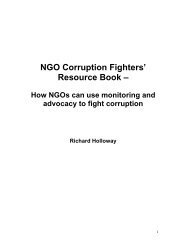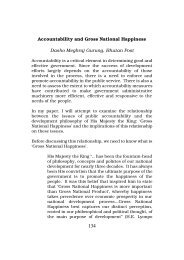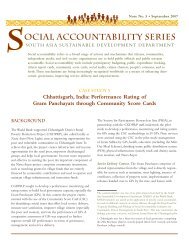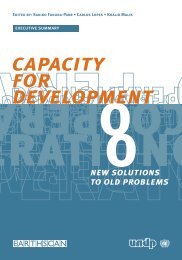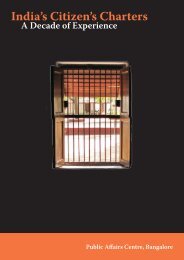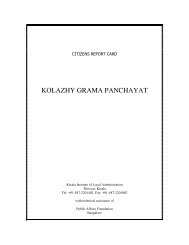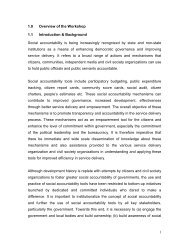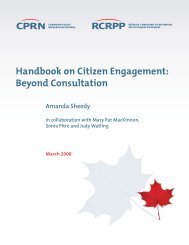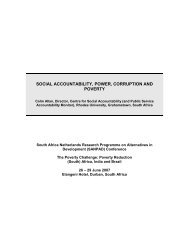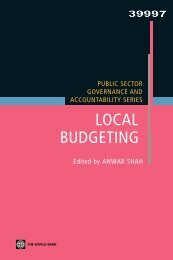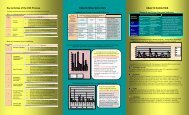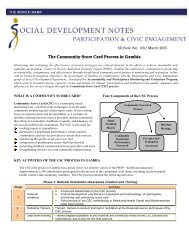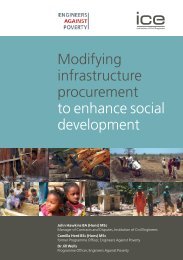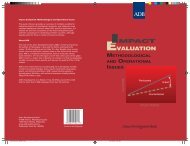Enabling Environment for Social Accountability in ... - SASANet
Enabling Environment for Social Accountability in ... - SASANet
Enabling Environment for Social Accountability in ... - SASANet
Create successful ePaper yourself
Turn your PDF publications into a flip-book with our unique Google optimized e-Paper software.
Part IV—Conclusion<br />
This study on the enabl<strong>in</strong>g environment <strong>for</strong> social accountability <strong>in</strong> Mongolia has illustrated diverse<br />
approaches to promot<strong>in</strong>g accountability of government <strong>in</strong>stitutions through civic engagement. These<br />
<strong>in</strong>clude legislative advocacy, participatory public expenditure monitor<strong>in</strong>g, <strong>in</strong><strong>for</strong>mation campaigns, and<br />
community score cards. These mechanisms have had mixed results because of certa<strong>in</strong> factors external to<br />
civil society (the political, economic, legal, and socio-cultural context) and <strong>in</strong>ternal factors (CSO capital,<br />
governance, and accountability) that affect the ability of civil society actors to exercise their Voice, ga<strong>in</strong><br />
access to In<strong>for</strong>mation, and Negotiate with public officials to promote social accountability (part II). In<br />
particular, the study concurs with the f<strong>in</strong>d<strong>in</strong>gs of the 2005 World Bank study, “Civil Society <strong>in</strong><br />
Mongolia’s Development and Governance: An Overview of Trends, Constra<strong>in</strong>ts, and Opportunities”<br />
(F<strong>in</strong>ch 2005), which established that CSO f<strong>in</strong>ancial constra<strong>in</strong>ts lead to a high level of dependency on<br />
<strong>for</strong>eign resources and limits their ability to fulfill their missions, <strong>in</strong>clud<strong>in</strong>g civic engagement.<br />
There are several key issues identified by this study. First, the f<strong>in</strong>d<strong>in</strong>gs and recommendations<br />
(summarized <strong>in</strong> the chart <strong>in</strong> section 4.2) <strong>in</strong>dicate the need <strong>for</strong> legal and regulatory re<strong>for</strong>ms, <strong>in</strong>clud<strong>in</strong>g the<br />
adoption of an Access to In<strong>for</strong>mation Law as well as the re<strong>for</strong>m of the defamation regime and the Law on<br />
State Secrets. In addition there is a need <strong>for</strong> <strong>in</strong>stitutional re<strong>for</strong>m and capacity build<strong>in</strong>g among the<br />
stakeholders to re<strong>in</strong><strong>for</strong>ce a political culture of accountability among not only public officials but also all<br />
stakeholders that share the common goal of good governance and economic development <strong>in</strong> Mongolia.<br />
This po<strong>in</strong>t is closely tied to the f<strong>in</strong>al key issue raised <strong>in</strong> this study: For Mongolia to reap the potential<br />
benefits of civic engagement and social accountability, it must be given time, resources, and a<br />
commitment by all stakeholders.<br />
It is recommended that <strong>for</strong>mal dissem<strong>in</strong>ation of this report, which took place <strong>in</strong> March 2005, should be<br />
complemented by broader dissem<strong>in</strong>ation to more stakeholders across the country. In addition to <strong>in</strong><strong>for</strong>m<strong>in</strong>g<br />
the GoM’s re<strong>for</strong>m agenda, the report should cont<strong>in</strong>ue to be a part of the <strong>in</strong>-country dialogue on<br />
governance and accountability <strong>in</strong> Mongolia, as much as it is an important resource to the Bank’s own<br />
Governance Assistance Project, and the strategies and programs of other donor agencies and CSOs.<br />
Moreover, the highly participatory, multi-stakeholder approach employed <strong>in</strong> the study can help to<br />
strengthen constituencies <strong>for</strong> re<strong>for</strong>ms <strong>in</strong> Mongolia, and promote new frameworks of collaboration.<br />
47



